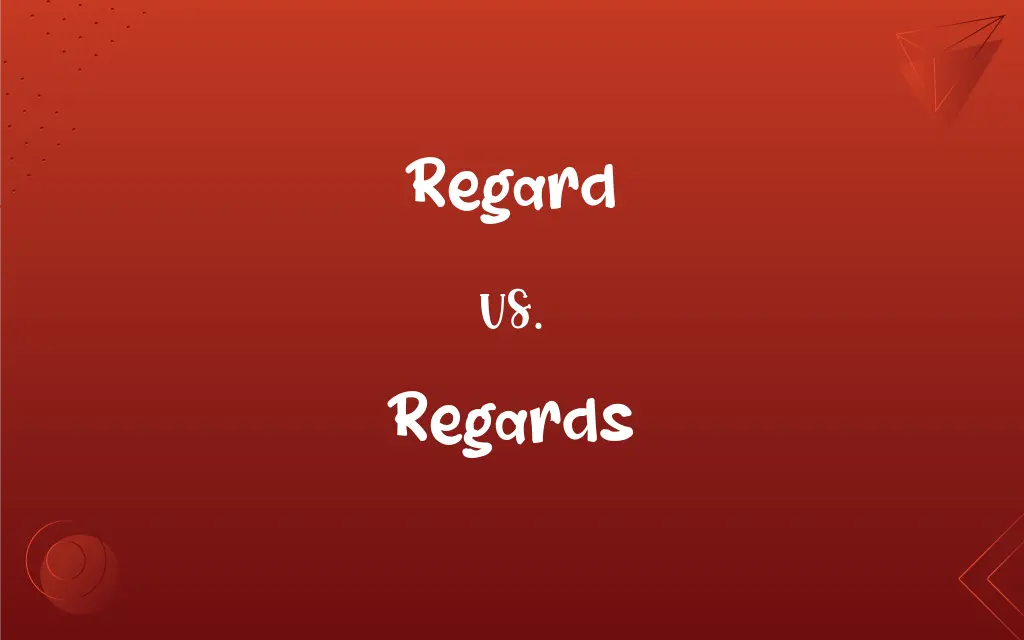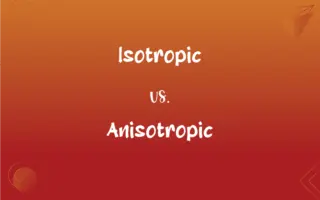Regard vs. Regards: What's the Difference?
Edited by Aimie Carlson || By Harlon Moss || Updated on October 27, 2023
"Regard" means attention, concern, or esteem, while "regards" often refers to greetings or best wishes.

Key Differences
"Regard" is a versatile word in the English language. It can denote attention or observation, as when one is asked to "regard" a particular object or situation. The word can also imply esteem or affection, suggesting a deep level of respect or admiration for someone or something. "Regards," on the other hand, is frequently utilized at the end of correspondence to offer well-wishes or greetings, like "warm regards" or "best regards."
Moreover, "regard" can be a measure of consideration or concern. For example, one might act with regard for another's feelings, showcasing empathy or mindfulness. "Regards," conversely, has a plural form that can indicate multiple instances of observation or consideration. Still, this usage is less common compared to its salutary role in letters and emails.
In some contexts, "regard" can function as a verb, implying the act of considering or appraising. You might "regard" a piece of art, meaning you are observing or evaluating it. "Regards" doesn’t serve as a verb in this way. Instead, it remains a noun, typically found in plural form, often in closing statements or as a way to convey good wishes.
"Regard" is sometimes used in expressions like "in regard to" or "with regard to," indicating a subject of discussion or concern. Meanwhile, "regards" doesn't fit into such phrases and remains distinct in its role as a conveyance of greetings or sentiments.
Comparison Chart
Usage in Correspondence
"In this regard, we need action."
Closing a letter: "Warm regards, [Name]."
ADVERTISEMENT
Grammatical Form
Singular noun; can also be a verb.
Plural noun; primarily used to convey greetings.
Example Phrases
"With regard to," "in regard to."
N/A
Associated Expressions
"Hold in high regard," "without regard for."
"Send my regards," "with regards to."
Regard and Regards Definitions
Regard
Consideration or attention directed at something or someone.
Please give this matter your immediate regard.
Regards
Observations or considerations (less common).
The artist's works have various regards.
ADVERTISEMENT
Regard
A specific point or aspect.
In this regard, we need to reassess our strategy.
Regards
Greetings or expressions of goodwill.
She sent her regards to the family.
Regard
To think of or consider in a particular way.
I regard him as a trusted friend.
Regards
Affectionate salutations.
He asked me to pass on his warm regards.
Regard
A look or gaze.
She gave me a regard full of curiosity.
Regards
Best wishes at the end of a correspondence.
Kind regards, Jessica.
Regard
An estimation or respect for someone.
She has a high regard for her teacher's opinions.
Regards
Friendly sentiments expressed for someone not present.
Please give my regards to your brother.
Regard
To think of or consider in a particular way
I regard him as a fool.
Regards
To think of or consider in a particular way
I regard him as a fool.
FAQs
Is "regards" ever used as a verb?
No, it's primarily a noun.
How is "regards" commonly used in correspondence?
As a closing greeting, like "best regards."
How do you use "regard" in the context of consideration?
"He acted without regard for consequences."
If I'm discussing a specific point, which word should I use?
Use "regard," as in "in this regard."
Can "regard" function as a verb?
Yes, as in "to regard someone highly."
Are "regard" and "regards" interchangeable?
No, they have different primary uses and meanings.
Can "regards" indicate multiple observations?
While possible, this usage is less common than its role as a greeting.
How can I incorporate "regard" in a sentence about respect?
"She holds him in high regard."
What does "regard" primarily mean?
It denotes attention, concern, or esteem.
Can I use "regards" in the middle of a letter?
Typically, it's used at the end, but you can also use it to convey greetings from another person.
Is "with regards to" a correct phrase?
It's more standard to use "with regard to" without the "s."
In which contexts would "regard" be inappropriate to replace with "regards"?
When referring to esteem or consideration, "regards" wouldn't fit.
Is "warm regards" a common closing?
Yes, it's a friendly and slightly more personal way to end a letter.
Is "regard" ever used in the plural form like "regards"?
Rarely, unless you're referring to multiple instances of observation or consideration.
Can "regards" be used outside of letter closings?
Yes, like when passing greetings: "Send my regards to Jane."
Is "regarding" related to "regard"?
Yes, "regarding" means concerning or about and is related to "regard."
Does "regard" always indicate a positive sentiment?
Not necessarily; its meaning depends on context.
How should I use "regards" if conveying greetings from another person?
"John sends his regards."
Which is more formal: "regards" or "best wishes"?
Both are formal, but "regards" is more commonly used in professional settings.
Is "in regards to" grammatically correct?
The preferred form is "in regard to."
About Author
Written by
Harlon MossHarlon is a seasoned quality moderator and accomplished content writer for Difference Wiki. An alumnus of the prestigious University of California, he earned his degree in Computer Science. Leveraging his academic background, Harlon brings a meticulous and informed perspective to his work, ensuring content accuracy and excellence.
Edited by
Aimie CarlsonAimie Carlson, holding a master's degree in English literature, is a fervent English language enthusiast. She lends her writing talents to Difference Wiki, a prominent website that specializes in comparisons, offering readers insightful analyses that both captivate and inform.































































